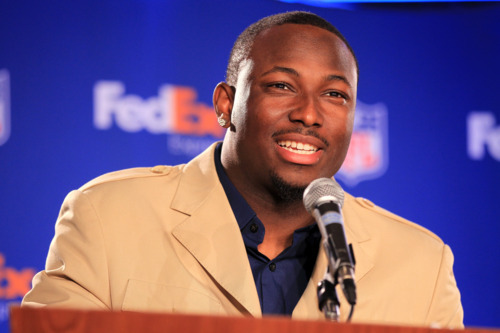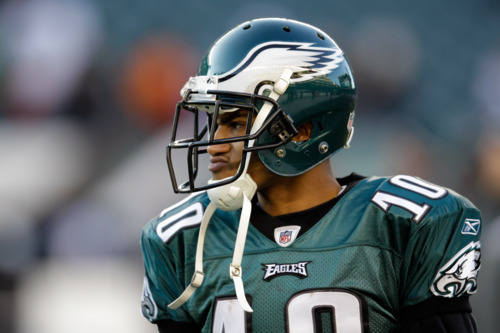
One of the most worrisome characteristics of Eagles front office in the last couple of years has been its seeming reluctance to hand out early contract extensions to their young players.
Now, there have been extenuating circumstances. For starters, the drafting has been poor overall, so there haven’t been many players since 2008 that have been worth extending. Additionally, the collective bargaining agreement drama delayed some contract talks.
However, the Eagles now have three young offensive stars who are/should have been prime candidates for extensions. DeSean Jackson, obviously, is the most urgent name. He’s scheduled to be a free agent in just a few weeks and the team is reportedly far apart in negotiations. Perhaps Jackson has been asking for a salary that’s too high, but in any case this could be a failure the Eagles front office hasn’t seen since Jeremiah Trotter left after the 2001 season.
On the flip side, Jeremy Maclin still has two years on his deal, so it’s not quite an emergency for him. If the Eagles are still operating with the same principles they did a few years back, though, he would be a prime candidate for a below-market value extension this offseason.
The middle case is LeSean McCoy, the Eagles All-Pro running back, who is about to enter the final year of his rookie contract. An extension with McCoy has to happen as soon as possible, lest the Eagles risk another DeSean situation. If an extension is worked out, we may be able to write off that problem as one special to, if not created by, Jackson.
Besides, McCoy has said publicly that he doesn’t want to end up like DeSean:
“Let me be honest with you, I never want to be in that situation,” McCoy said. “Everybody’s situation is different. [An extension] would be a blessing if that happened because I don’t want to go anywhere else or play anywhere else. I love it here. I’m a Pennsylvania guy – from high school to college to here.”
(Read what you will into McCoy twice firing and and re-hiring Drew Rosenhaus during the season.)
Still, the Eagles have already hurt themselves by failing to lock up McCoy a year ago. Back in October, I wrote about what that potential contract could look like. Here, again, are the most recent running back deals:
2011- Chris Johnson (25): 6 years, $55 million, $30 million guaranteed
2011- Adrian Peterson (26): 7 years, $96 million, $36 million guaranteed
2011- Frank Gore (28): 4 years, $26 million, $14 million guaranteed
2011- DeAngelo Williams (28): 5 years, $43 million, $21 million guaranteed
2010- Jamaal Charles (24): 6 years, $28 million, $10 million guaranteed
2009- Maurice Jones-Drew (24): 5 years, $31 million, $18 million guaranteed
2008- Steven Jackson (25): 6 years, $45 million, $21 million guaranteed
2008- Michael Turner (26): 6 years, $35 million, $15 million guaranteed
At the time I suggested McCoy’s production put him in line for a similar deal to the one signed by Jamaal Charles, who had comparable stats through his first three seasons. However, McCoy’s monster 2011 dwarfs Charles’s top production so far. That one year still doesn’t get him up to Peterson-Johnson stratosphere, but I’d be surprised if isn’t looking more at the Jones-Drew range.
A complicating factor is the pending free agency status of Ray Rice and Matt Forte. Both young, complete running backs are likely candidates for long term extensions in the coming weeks. The Eagles and McCoy may choose to wait until the running back market is set by those players before getting serious about negotiations.
It’s not ideal, given the opportunity the Eagles had to lock him up at a lower rate, but as long as a contract extension happens this offseason I don’t think any fans will complain.
Photo from Getty.



